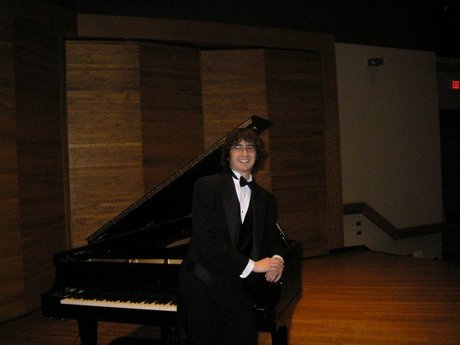|
I thought that a good summer project would be to revisit some old performances of mine. The oldest recordings of myself that I know to be in existence are from my second year of my undergraduate studies. I haven't found the CD of that session, but I'm sure it's somewhere in my home. I do have my junior and senior recitals, plus several other recordings from my undergraduate years, not to mention all recitals I've done since, and non-recital sessions of other works too. I'm lucky that I've made sure to get decent recordings of almost all major repertoire i've learned.
My memory would tell me that my piano playing back in the day was awful. I've improved technically since then, and clearly I had no idea how to listen to my own playing, interpret music correctly, or practice for strong, individual performances. As I listen back, I was actually quite wrong. I don't hate my playing from my late teens and early twenties. I hear problems in it, but I also hear an individualistic artistry which I recognize as an early version of my playing today. So I thought I'd share some old personal recordings and comment on them. First up is my Junior recital from January 19, 2007. This was my first full recital program ever, including Bach's Prelude and Fugue in D, WTC II, de Falla's The Miller's Dance, a couple Debussy Preludes, Morel's 2nd Study in Sonority, (maybe something else?) along with this Haydn Sonata. This date is the only time I ever wore a tux with tails, rented for the occasion, and for some reason, I thought so much hair was a good idea.
that one of my biggest issues was a tight hand and wrist, likely due to under utilized finger position, and poorly integrating all of my upper limbs. You can also hear it in the scalar passages like M. 36-37.
Some of the musicality is naive. You can count out all of the fermatas, they're far too unoriginal and ill-contrived. I would like to hear more detail in the articulations, especially a closer attention to slurs. A lot of "hits" are the exact same strength, i.e. M. 74, 76. But on the good side, I do back off for M. 78 to create a nice little line. There are other moments where I listen and match the tension and release of a line well, say M. 60-61 I really like how I listen to the ends of phrases; M. 4-5 and M. 6-7 make a nice pair, and M. 10 captures the confusion of landing on this strange chord really well. Overall, it sounds like I do get the jocular character of this piece quite well. I don't have all the tools to execute it yet, but I do hear something in my playing that I like, and I'm grateful that I had great teachers who heard it as well. |
"Modern performers seem to regard their performances as texts rather than acts, and to prepare for them with the same goal as present-day textual editors: to clear away accretions. Not that this is not a laudable and necessary step; but what is an ultimate step for an editor should be only a first step for a performer, as the very temporal relationship between the functions of editing and performing already suggests." -Richard Taruskin, Text and Act Archives
March 2021
Categories
All
|

 RSS Feed
RSS Feed
